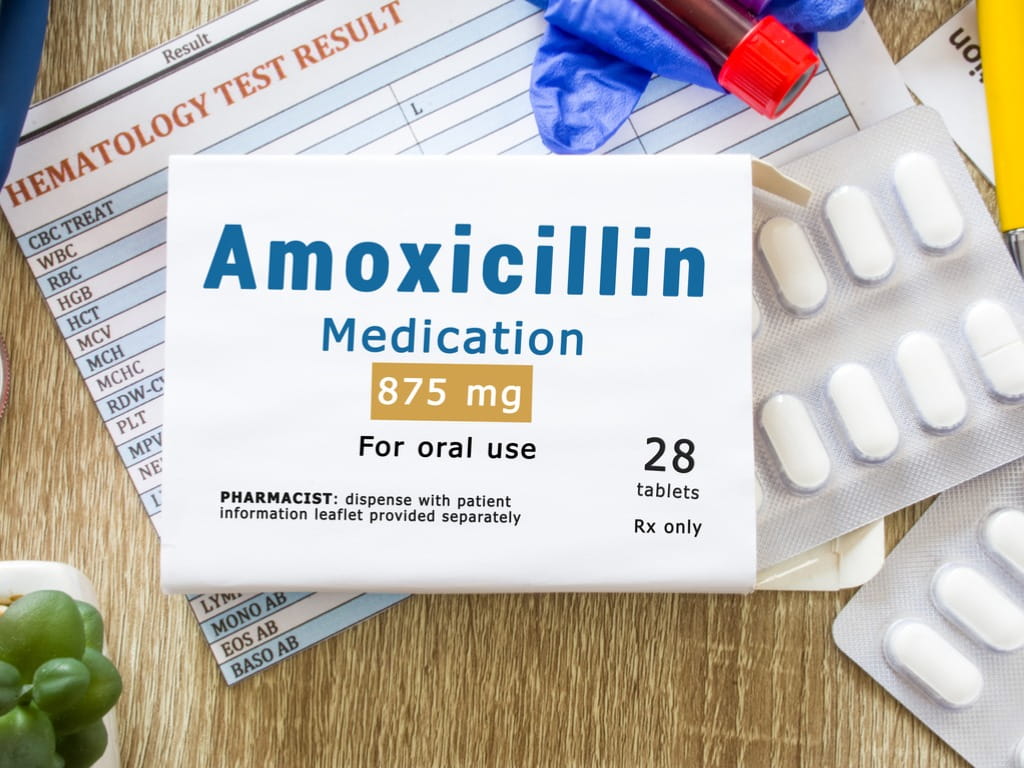Taking Amoxicillin During Pregnancy and Breastfeeding

The Bottom Line
Amoxicillin is an antibiotic commonly prescribed for pregnant women who have bacterial infections. Use of amoxicillin during pregnancy and while breastfeeding is generally safe, but in some cases, rare side effects can occur.

What is amoxicillin?
Amoxicillin is an antibiotic that is very similar to penicillin. It works by blocking bacterial cell wall production, leading to bacterial death. Amoxicillin is commonly used for the treatment of respiratory and urinary tract infections and is frequently prescribed to pregnant women for the treatment of these conditions. While amoxicillin is assumed to be safe in pregnancy, it does transfer from the mother’s bloodstream to the placenta, and therefore it is important to recognize the potential risks associated with the use of amoxicillin in pregnancy.
Is amoxicillin safe to take during pregnancy?
Amoxicillin is classified by the U.S. Food and Drug Administration (FDA) as Pregnancy Category B. This means that multiple studies of the use of amoxicillin in pregnant animals have not shown fetal harm to occur after the mother takes amoxicillin, but there are not adequate or well-controlled studies of the use of amoxicillin in pregnant women. In animal studies, the use of amoxicillin at doses up to 10 times the standard human dose has not been associated with reproductive harm. A few human studies found that amoxicillin might be associated with birth defects, specifically an increased risk for cleft palate, when used in the first trimester of pregnancy (the period of fetal organ development). Multiple other human studies have not demonstrated any harmful effects of amoxicillin on fetal development.
Amoxicillin is often prescribed in combination with another drug called clavulanic acid. Clavulanic acid prevents amoxicillin from being broken down, making this combination of drugs more effective against resistant bacteria than amoxicillin alone. The combination of amoxicillin and clavulanic acid is known as Augmentin. Like amoxicillin, there are scant data suggesting that the use of clavulanic acid in pregnancy is harmful to the fetus. Overall, the use of amoxicillin, with or without clavulanic acid, can be considered generally safe for use in pregnant women.
If a woman takes amoxicillin before realizing that she is pregnant, there is likely nothing to worry about in terms of fetal health and safety. The health and development of a fetus are largely dependent on its mother, so it’s very important for pregnant women and women of childbearing age to stay as healthy as possible. Sometimes, this can include taking antibiotics like amoxicillin. An untreated maternal infection poses a substantial risk to the health of a fetus.
Can I take amoxicillin if I am breastfeeding?
Amoxicillin is safe for use in women who are breastfeeding. Its physical characteristics, including low fat solubility, low protein binding, and acidic pH, limit its transfer into breastmilk. The American Academy of Pediatrics considers this drug to be safe to take when breastfeeding.
Does amoxicillin have any side effects?
All drugs, including prescription medications, can cause unwanted and potentially dangerous side effects. Augmentin can rarely cause liver injury. In one study, an infant whose mother took Augmentin was noted to have abnormally high liver enzymes. The infant’s liver enzymes returned to normal after the mother stopped taking Augmentin. Both amoxicillin and Augmentin are known to cause allergic reactions, including anaphylaxis, in susceptible people. Since the antibodies that cause anaphylaxis do not cross the placental barrier, the development of anaphylaxis in a fetus is extremely unlikely to occur. However, maternal anaphylaxis can cause abnormal blood flow to the uterus. This can affect the fetus and result in brain swelling, neurological damage, and fetal death.
If you suspect an adverse reaction after taking amoxicillin, get an immediate personalized recommendation online or call Poison Control at 1-800-222-1222. Both options are free, confidential, and available 24 hours a day.
Kelly Johnson-Arbor, MD
Medical Toxicologist
Poison Control Media Information
Did you find this page helpful? If so, we need your support. Poison Control is in constant competition with misinformation online. Links to www.poison.org or our webPOISONCONTROL triage tool from other websites and blogs help internet searchers quickly find accurate information and Poison Control’s contact information in an emergency. If you use the content from this page, please provide attribution via a link back to this page, www.poison.org, or https://triage.webpoisoncontrol.org/#!/exclusions. By doing so, you could save a life. Thank you!
Poisoned?
Call 1-800-222-1222 or
Prevention Tips
- Only take medications that are prescribed for you. Do not take medications that are prescribed for other people.
- Know that antibiotics are only effective for bacterial infections. They do not treat viral infections such as the flu, croup, RSV, or COVID-19.
- If you are pregnant or breastfeeding, talk with your doctor prior to taking over-the-counter medications, dietary supplements, or prescription drugs.
This Really Happened
A 28-week-pregnant woman developed an ear infection and was prescribed amoxicillin. After taking the second dose of the drug, she developed itching, lip swelling, vomiting, and dizziness. She was diagnosed with anaphylaxis (a severe allergic reaction) and was admitted to a hospital, where she was treated with corticosteroids and antihistamines. Her fetus appeared normal on an ultrasound examination, and she was subsequently discharged from the hospital. The following day, she was admitted to another hospital after experiencing decreased fetal movement. Due to an abnormal ultrasound examination, she underwent an emergency cesarean delivery. The mother was discharged from the hospital 4 days later, but her infant remained critically ill and died after an 11-day hospitalization. At autopsy, the fetus was noted to have severe brain damage that was attributed to maternal anaphylaxis (from Berenguer et al., 2013).For More Information
References
Amoxil® prescribing Information. GlaxoSmithKline. November, 2006. Accessed November 25, 2023.
Saudagar PS, Survase SA, Singhal RS. Clavulanic acid: a review. Biotechnol Adv. 2008;26(4):335–351.
Poisoned?
Call 1-800-222-1222 or
Prevention Tips
- Only take medications that are prescribed for you. Do not take medications that are prescribed for other people.
- Know that antibiotics are only effective for bacterial infections. They do not treat viral infections such as the flu, croup, RSV, or COVID-19.
- If you are pregnant or breastfeeding, talk with your doctor prior to taking over-the-counter medications, dietary supplements, or prescription drugs.
